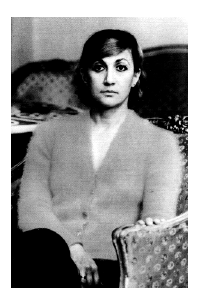Alberto Moravia
(New York Review)

I mean, nothing changes, on the surface, but you want to be sure, so you say things like, "Have things changed between us?" And she says, "Oh? Do you think so?" And you say, "Yes. Are you sure you still love me?" And she says, "O yes. What do you mean?"
You aren't so sure --- the way she said it and all. Didn't her words, her look, seem a bit different? Is she lying to me? Is something going on, and she isn't telling me? So you start worrying her more and more, asking is she sure she loves you; asking if she notices any change. And you do it so much, make such an issue of it, that it starts to become an issue. Soon enough you are driving her batty with your endless questions, and worry.
That's Contempt. Like all of Moravia's novels --- it is a tale that is told with a spare elegance. Moltari is a poor screen writer, working for the producer Battista. Emilia, Moltari's wife, is such a good housekeeper, cleans their rented apartment so, that he is convinced that they should have a house of their own. He doesn't ask her --- he just assumes that they must have a house, so he signs on for a job he hates --- turning The Odyssey into a popular movie for the producer.
Out of this excruciatingly simple story Moravia weaves a wondrous tale of elegant misunderstanding. It is a story of a man destroying love, his life, his happiness --- just because he is an endless, worrier, meddler and, worst of all, an intellectual. But because it is Moravia, the tale of Ulysses and Penelope and the Odyssey gets intertwined with the tale of Emilia and Moltari. Also, because it is Moravia --- it happens slowly, agonizingly: Did Ulysses leave because his marriage was on the rocks? Did he spend forever returning from Troy because he really didn't want to be back with her again. What exactly made Emilia come to a point where she can tell Moltari, "I despise you!"
It's a story of people with too much smarts bound- I said before (in my review of A Woman of Rome) that Moravia is an anomaly: no other writer in my experience knows to plumb --- simply, wisely --- the heart of woman. Coupled with that is the artful understatement of an evolving, gripping tale --- so that when the moments of passion and madness arrive, as they must, they blow up into golden colors. This is Moltari and Emilia on the beach at Capri just as their love is falling apart. She is lying in the sun, naked --- and he comes to her, and kisses her: Without my knowing how it had happened, I found myself no longer sitting apart by myself, with my back against a rock, but kneeling beside Emilia, bending over her with my face held close to hers, while she lay motionless and asleep. I don't know how, but I had already removed the hat that hid her face, and, as I prepared to kiss her, I was looking at her mouth as one sometimes looks at a fruit before putting one's teeth into it. It was a large, very full mouth, and the redness of the lipstick upon it looked parched and cracked as though it had been dried up, not by the sun, but by some interior heat. I said to myself that that mouth had not kissed me for a very long time, and that the savor of the kiss, if it were returned by her as she lay thus between waking and sleeping, would be as intoxicating as that of some old, potent liquor. I think I must have gazed at her mouth for at least a minute; then, gradually, I lowered my lips to hers. But I did not immediately kiss her: I paused for a moment with my lips very close to hers. I felt the light, quiet breath that came from her nostrils; and also, it seemed to me, the warmth of her burning lips. I knew that behind those lips, inside her mouth --- like frozen snow preserved in a fold of sun-scorched earth --- lay the coolness of her saliva, as surprising, as refreshing as such snow would be. While I was relishing this foretaste, my lips came truly into contact with Emilia's. The touch did not appear to awaken her, nor to surprise her. I pressed my lips against hers, first softly, then more and more strongly; then, seeing that she remained perfectly still, I ventured upon a profounder kiss. This time I felt her mouth slowly opening, as I had hoped --- like a shellfish whose valves open at the pulsating movement of some living creature wet with cool sea-water. Slowly, slowly it opened, the lips drawing back over the gums; and at the same time I felt an arm encircling my neck. Such passion, bursting out of the slow and spiralling story of destruction, I was looking at her mouth as one sometimes looks at a fruit before putting one's teeth into it...like a shellfish whose valves open at the pulsating movement of some living creature wet with cool sea-water... and at the end of it all, Emilia is still lying on the beach, Moltari some distance from her, just looking at her, because it was a dream. Which is as it should be to the busy-
Such passion, bursting out of the slow and spiralling story of destruction, I was looking at her mouth as one sometimes looks at a fruit before putting one's teeth into it...like a shellfish whose valves open at the pulsating movement of some living creature wet with cool sea-water... and at the end of it all, Emilia is still lying on the beach, Moltari some distance from her, just looking at her, because it was a dream. Which is as it should be to the busy-